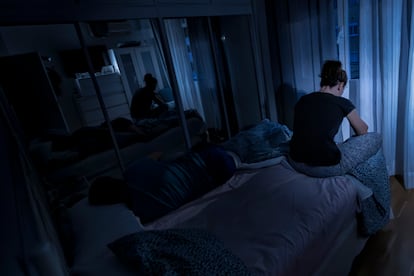Key (and not so obvious) tips on how to sleep more and better
Experts recommend not using your cellphone an hour before going to bed, avoiding heavy dinners and walking for an hour a day in sunlight


To get around his insomnia, Charles Dickens decided to put into practice the remedies that another insomniac of the time, Benjamin Franklin, had recommended and carried out successfully. As David Jiménez Torres writes in his book El mal dormir (or, The Bad Sleep): “The advice consisted of getting out of bed, turning the pillow over, shaking the sheets at least 20 times, walking around the room without dressing and, when the cold became unbearable, going back to bed.” By doing this several times a night, Franklin managed to exhaust himself and get to sleep. But Dickens only managed to wake himself up even more.
Nowadays, in hospitals, a patient suffering from sleep problems is given a list with much more useful and scientific directions. To achieve the best sleep hygiene, it is a good idea to follow these directions to the letter. This is the advice of experts:
- Go to bed and get up at a fixed time, even on the weekends. Maintaining the schedule on Saturdays and Sundays is key to avoid confusing the brain.
- If you lie down and can’t sleep for half an hour, get up. Do not stay in bed tossing and turning. “But don’t even think of turning on the TV or reading something you like,” explains Dr. Esmeralda Rocío-Martín. “It’s about getting bored. So do nothing or, if you want, start reading an old newspaper story.” If necessary, during this time use a warm, dim light. If you wake up and can’t sleep, do the same thing. The process must be repeated as many times as necessary.
- If you are insomniac or have sleep problems, avoid naps and situations that encourage them.
- Avoid distracting elements in the bedroom, such as the television, electric alarm clocks, radio, cellphones, etc.
- It is advisable to exercise in the open air for an hour a day. This does not have to be intensive exercise, a walk will do. If possible, exercise in the morning and avoid physical activity during three hours before you go to sleep.
- It is important that your body receives natural light outdoors for one or two hours a day. It doesn’t have to be direct sunlight (it doesn’t matter if it’s cloudy). Light, especially in the morning, is a powerful synchronizer of sleep-wake rhythms and also acts as an antidepressant. It also helps to avoid using cellphones and tablets at least an hour before going to bed. The blue light from these devices inhibits the secretion of the hormone melatonin, which is necessary for sleep.
- Keep the bedroom in the dark and avoid light pollution from outside. If necessary, use a sleep mask. Darkness is the necessary condition for melatonin to be released.
- Caffeinated drinks, such as coffee and cola, disturb sleep, even in people who do not feel the effects. Tobacco and alcohol are also harmful to sleep.
- Have dinner at least two hours before your bedtime. Heavy meals also negatively affect sleep, while a light meal has a positive impact.
- If you are suffering from insomnia, do not look at the clock. Forget time. Seeing how many hours you have left will only make you more anxious.
- At dusk, use warm lights to light up the room you are in. They will help induce your brain to settle down to sleep.
Sign up for our weekly newsletter to get more English-language news coverage from EL PAÍS USA Edition
Tu suscripción se está usando en otro dispositivo
¿Quieres añadir otro usuario a tu suscripción?
Si continúas leyendo en este dispositivo, no se podrá leer en el otro.
FlechaTu suscripción se está usando en otro dispositivo y solo puedes acceder a EL PAÍS desde un dispositivo a la vez.
Si quieres compartir tu cuenta, cambia tu suscripción a la modalidad Premium, así podrás añadir otro usuario. Cada uno accederá con su propia cuenta de email, lo que os permitirá personalizar vuestra experiencia en EL PAÍS.
¿Tienes una suscripción de empresa? Accede aquí para contratar más cuentas.
En el caso de no saber quién está usando tu cuenta, te recomendamos cambiar tu contraseña aquí.
Si decides continuar compartiendo tu cuenta, este mensaje se mostrará en tu dispositivo y en el de la otra persona que está usando tu cuenta de forma indefinida, afectando a tu experiencia de lectura. Puedes consultar aquí los términos y condiciones de la suscripción digital.








































